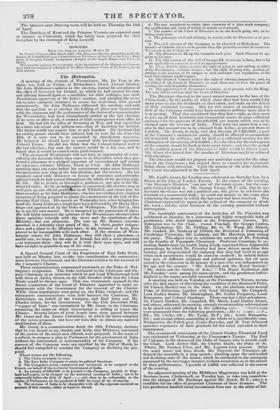A Special General Court of the Proprietors of East India
Stock, was held on Monday last, to take into consideration the communica- tions between Government and the Directors relative to the renewal of the Company's Charter. These communications commenced previously to the Duke of 'Wel- lington's resignation. The Duke intimated to the Chairman and De- puty-Chairman, at an interview which he and Lord Ellenborough held with them at A psley House, on the 12th October 1830, that the China Trade would be thrown open. This was strenuously opposed by the Secret Committee of the Court of Directors appointed to make ar- rangements with the Government for the renewal of the Charter. While these negotiations were going on, the Duke resigned; and the subsequent communications were held between the Chairman, Mr. Ravenshave, on behalf of the Company, and Earl Grey and Mr. Charles Grant, for the Government. On the 17th December 1832,
"a paper of hints" was transmitted by Mr. Grant to the Chairman,
containing the terms on which Government is willing to renew the Charter. Several letters of great length have since passed between Mr. Grant and the Secret Committee; in which the latter complain of the terms proposed, but have not been able to obtain any material modification of them.
Mr. Grant, in a communication dated the 12th February, declares that he was bound to say, frankly and fairly, that Ministers, convinced of the justice of the terms now offered, were prepared, in the event of a refusal, to propose a plan to Parliament for the government of India without the intervention or instrumentality of the Company. If the consent of the Company were not signified by the 23d of March, he should feel compelled to consider the Company as declining the pro- posal. These terms are the following.
I. The China monopoly to cease. 2. The East India Company to retain its political functions. 3. The Company's assets, commercial and territorial, to be assigned to the Crown, on behalf of the territorial Government of India. 4. An annuity of 630,0001. to be granted to the Company, payable in Eng- land half-yearly, to be charged on the territorial revenue of India ; not to be redeemable before the 25th of April —, and then to be redeemable, at the option of Parliament, on the payment of 1001. for every a 5s. of annuity.
5. The revenue of India to be chargeable with all the expenses incurred on account of that country, either at home or abroad.
6. The new annuitants to retain their character of a joint stock company; the qualification and right of voting to remain as at present.
7. The number of the Court of Directors to be one fourth going out, in ro- tation, every year. 8. The patronage, civil and military, to remain with the Directors as at pre- sent.
9. The civil servants of the Company to be educated at Haileybury. The number of students always to be greater than the probable number of vacancies. To remain in the College for —. 10. The Directors to fill up the vacancies each year. Each Director to ap- point in his torn. II. The 47th section of the 53d of George III. to remain in force, but to be made applicable to removals as well as appointments. 12. Every British subject to have the right of going to and settling at either of the Presidencies, xvitimut licence ; but the right of going into trading, or settling in the interior, to be subject to such restraints and regulations as the
local Government might require. •
13. The Board of Control to have the right of altering despatches; and, on the refusal of the Court of Directors to send them out, to have the power of sending out such despatches themselves.
14. The appointment of Governors to remain, as at present, with the King. The veto still to continue with the Court of Directors.
The Directors objected in the most earnest manner to the loss of the China trade ; by the profits of which alone they had been enabled for many years to pay the dividends on their stock, and make up the deficit of their territorial revenue. But for this source of emolument, the debt of the Company would have been seventeen millions more than it is at present. They also considered that they had a right, as they were to give up all their territorial and commercial assets, to some collateral guarantee for the payment of the 030,000/. per annum which was to be charged upon the revenue of India. They were not aware how a stir-
puts to that amount was to be obtained. from India ; at present there is a deficit. Mr. Grant, in reply, said that the sum of 1,200,000L, a part of the Company's commercial assets, should be allowed to accumulate till it reached six millions, and be held as a collateral security for the redemption of the annuity of 630,000/. ; that the time for the redemption of the annuity should be fixed at forty years hence ; and that the period of the political power of the Directors in India would be fifteen years. Mr. Grant also hinted that the number of Directors might be reduced with advantage.
The Directors would not propose any particular course for the adop- tion of the Proprietors ; but begged them to examine the documents before them with attention. Upon the motion of Sir John Malcolm, the Court was adjourned to the 15th April.


















 Previous page
Previous page